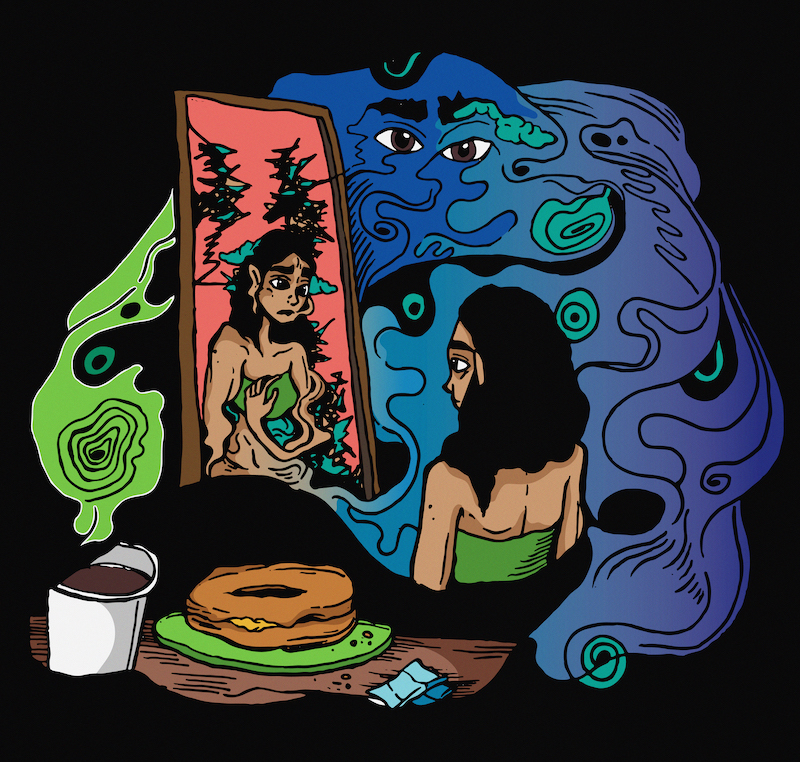Content Warning: This story discusses body dysmorphia and eating disorders. If you or a loved one struggle with this please contact the National Eating Disorder Association Hotline: 1-800-931-2237
On Monday, October 19th, I woke up to my phone pinging at 5:10 a.m. I had set my alarm for 5:30 a.m with plans to walk across the Brooklyn Bridge and watch the sunrise. A friend of mine was set to meet me at my East Village apartment, and from there we would walk to the bridge. The idea was something he had once proposed to me during the bleak months of April or May, where we would watch the sunrise followed by bagels afterward.
As we sat waiting for the sun to rise in the middle of the Brooklyn Bridge, we talked about how these were moments we needed to experience more often: how it can be too easy to become comfortable with our routines; how we both — myself in-particular — need adventure; how it is always best to step outside of your comfort zone; how we both didn’t come to New York City to only exist within the parameters of one area. We talked about living and how, if anything, this year has taught us the uncertainty of a tomorrow. We asked ourselves why we would put off experiences for the future when the future might not be there by the time we’re ready.
As the sun rose, we walked across the bridge to catch the train back to Manhattan for coffee and bagels. Now, normally I have a strict rule about getting bagels, they are a holy activity reserved only for hangovers and late morning breakfasts. Otherwise, in my book, there’s no rational reason for me to eat a bagel for breakfast.
I’ve spent most of my life rationalizing my eating habits. It began with harmless comments about my weight when I was young and manifested into living in a constant distorted view of my body and physical appearance. I wrote a personal essay during quarantine about living with body dysmorphia during the global pandemic, and I would like to come back and say that I wasn’t fully transparent or honest.
I remarked in the piece that being in New York City helped me cope with my disordered thinking; however, the truth is, living in New York helped me enable it. I didn’t want to admit this at the time, but I believe it is important for me to say this now. So often, when I read personal essays detailing stories of recovery or struggles, the illnesses seem to be written as a struggle of the past or the author appears removed from that way of thinking. I have been guilty of this and am hypocritical for doing so. I want to de-stigmatize the conversations surrounding eating disorders and body dysmorphia. I am still struggling.
Yes, I have good days, weeks, but I also have bad days, weeks, months — where I refuse to wear anything except one outfit until I am satisfied with my appearance again, where I find I am working out not because I want to, but simply to shut off the voices inside my head.
With everything shut down due to COVID-19, and being unemployed myself, I spent much of my summer in New York with too much free time, allowing me to hyper-focus on my appearance, since there wasn’t much else to occupy me otherwise.
It’s important to note that I never said I was cured. In fact, during and after publishing that personal essay, I experienced a number of challenging weeks regarding body image.
As we were walking to Tompkins Square Bagels — which I had suggested we go to — I was almost hoping he would decide to nix the idea. I knew that eating one bagel for breakfast one or two days of the week probably won’t do anything to me physically, even if I had been eating less-than-healthily the weekend prior — celebrating with cake and making cookies with friends. Nevertheless, I like to spread out my indulgences.
I told my friend I didn’t normally just eat bagels for breakfast without a specific catalyst or reason, to which he only replied, “I don’t think bagels are as an unhealthy food option as you seem to think they are.” He went on to add something that really hit me:“You say that you want to live for and with experiences, so, if that’s true, why overthink eating a bagel?”
He was right. I can’t claim to live fearless and embrace all experiences, and limit myself to whether or not I can have a bagel for breakfast.
I’ve let my tumultuous relationship with food and my own self-image ruin things for me. I have skipped out on plans, caused rifts in my friendships and hurt myself. I have allowed what I consume to consume me — especially during this pandemic — and I’m working on remedying that. With all the damage this has caused me recently, it’s been important for me to step back and focus on detaching my well-being from my self image.
I’ve been working at this for several weeks, facing both good and bad periods of time. I’ve been working on following intuitive eating. Allowing myself to eat what I crave when I crave it, I’ve found helps my relationship with food. I’ve been trying to treat exercise as a meditation for my mental state rather than a daily requirement. And, after many failed attempts, I’ve decided to start therapy.
On some days these tasks are easier, and The difference between then and now is that I have begun to focus less on my physical appearance, and enjoy more of what life and food have to offer, because, like I said, there is no certainty of a tomorrow, so why worry about it today?







